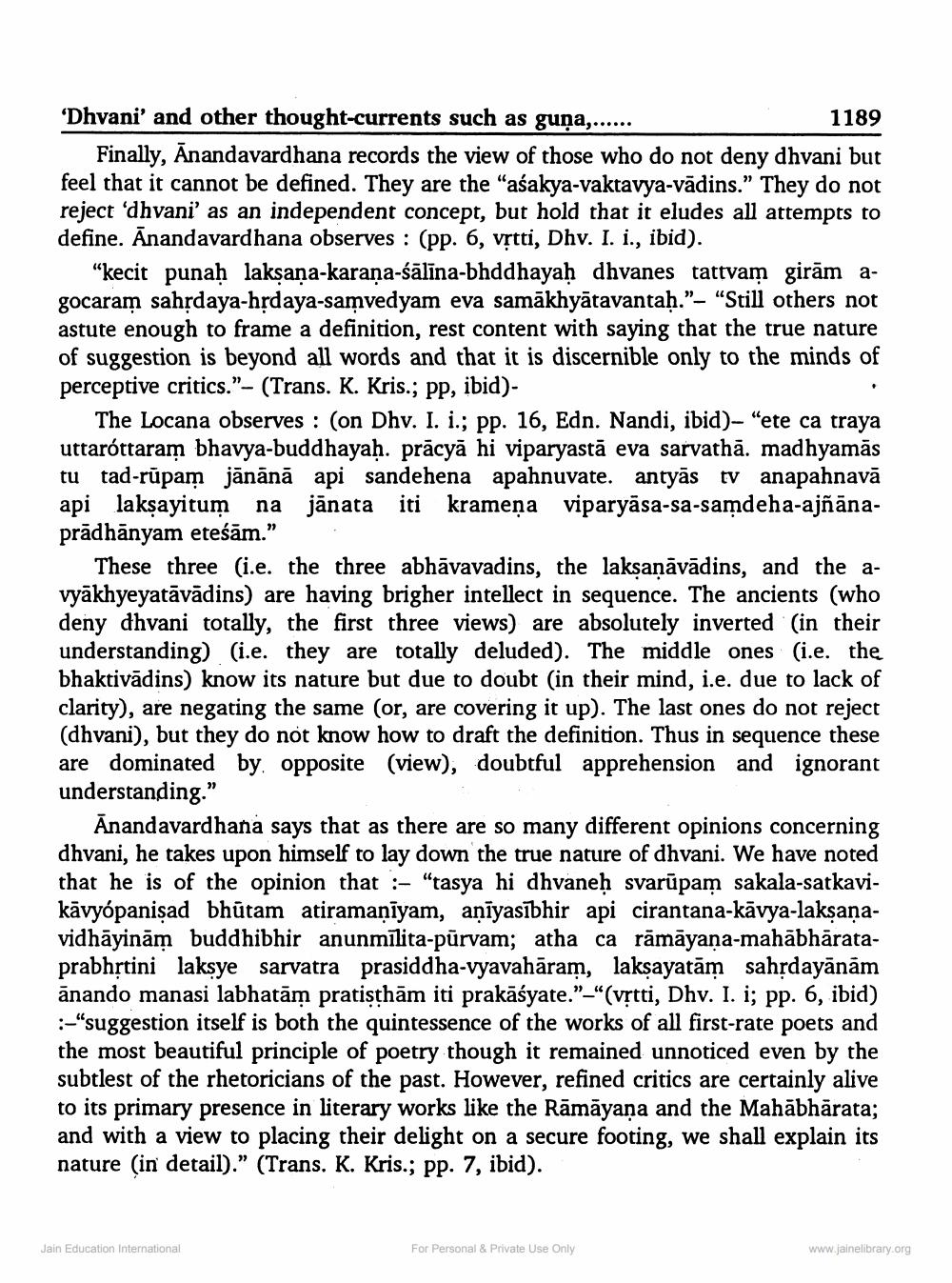________________
'Dhvani' and other thought-currents such as guņa,.....
1189 Finally, Anandavardhana records the view of those who do not deny dhvani but feel that it cannot be defined. They are the "asakya-vaktavya-vādins.” They do not reject 'dhvani' as an independent concept, but hold that it eludes all attempts to define. Ānandavardhana observes : (pp. 6, vịtti, Dhv. I. i., ibid).
"kecit punaḥ laksana-karana-śālīna-bhddhayaḥ dhvanes tattvam girām agocaram sahşdaya-hrdaya-samvedyam eva samākhyātavantah."- "Still others not astute enough to frame a definition, rest content with saying that the true nature of suggestion is beyond all words and that it is discernible only to t perceptive critics."- (Trans. K. Kris.; pp, ibid)
The Locana observes : (on Dhy. I. i.; pp. 16, Edn. Nandi, ibid)- "ete ca traya uttaróttaram bhavya-buddhayaḥ. prācyā hi viparyastā eva sarvathā. madhyamās tu tad-rūpam jānānā api sandehena apahnuvate. antyās tv anapahnavā api laksayitum na janata iti kramena viparyāsa-sa-samdeha-ajñānaprādhānyam eteśām."
These three (i.e. the three abhāvavadins, the lakṣaṇāvādins, and the avyākhyeyatāvādins) are having brigher intellect in sequence. The ancients (who deny dhvani totally, the first three views) are absolutely inverted in their understanding) (i.e. they are totally deluded). The middle ones (i.e. the bhaktivādins) know its nature but due to doubt (in their mind, i.e. due to lack of clarity), are negating the same (or, are covering it up). The last ones do not reject (dhvani), but they do not know how to draft the definition. Thus in sequence these are dominated by, opposite (view), doubtful apprehension and ignorant understanding."
Anandavardhana says that as there are so many different opinions concerning dhvani, he takes upon himself to lay down the true nature of dhvani. We have noted that he is of the opinion that :- "tasya hi dhvaneh svarūpam sakala-satkavikāvyópanişad bhūtam atiramanīyam, anīyasībhir api cirantana-kāvya-laksanavidhāyinām buddhibhir anunmīlita-pūrvam; atha ca rāmāyana-mahābhārata
laksye sarvatra prasiddha-vyavahāram, laksayatām sahrdayanam ānando manasi labhatām pratisthām iti prakāśyate.”-“(vrtti, Dhv. I. i; pp. 6, ibid) :-“suggestion itself is both the quintessence of the works of all first-rate poets and the most beautiful principle of poetry though it remained unnoticed even by the subtlest of the rhetoricians of the past. However, refined critics are certainly alive to its primary presence in literary works like the Rāmāyana and the Mahābhārata; and with a view to placing their delight on a secure footing, we shall explain its nature (in detail)." (Trans. K. Kris.; pp. 7, ibid).
Jain Education International
For Personal & Private Use Only
www.jainelibrary.org




